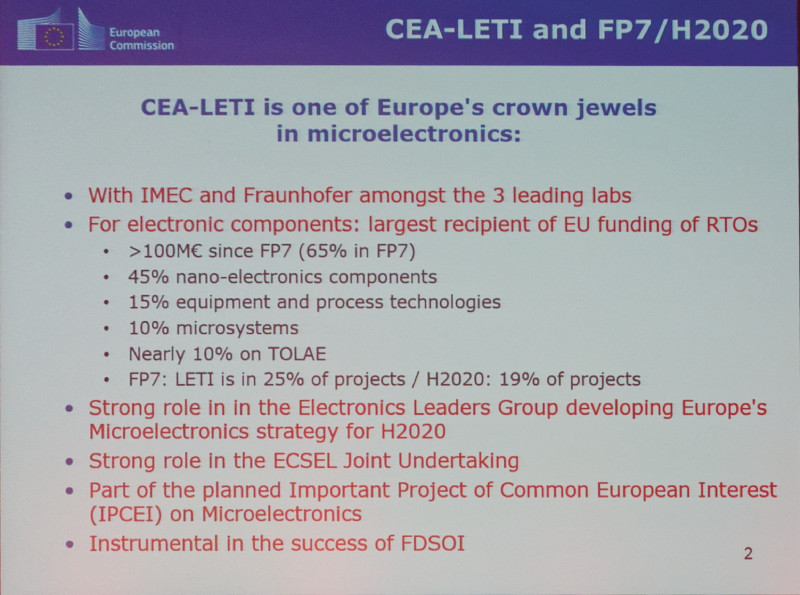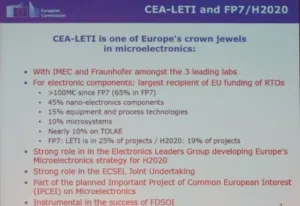The final speaker was Max Lemke of the European Commission which works with LETI in a number of areas. Lemke is head of the Ulit Technologies & Systems for Digitising Industry. He first summarised the European position of Leti.

Leti is one of the “crown jewels” of research in microelectronics along with IMEC and the Fraunhofer in Europe. FP7 has been a huge effort to fund research and Leti is involved in 25% of the projects and 19% of those in the H2020 initiative. The EU has put in funding of more than €100m since the start of the FP7 round and 45% of that money has gone into nano-electronics and associated areas.
 Max Lemke said that nano-electronics is important for the EU. Image:Meko
Max Lemke said that nano-electronics is important for the EU. Image:Meko
Lemke said that Leti is involved in “Cyber-physical” systems including software and can cover the whole chain of research and development. The EU is trying to create a digital Single Market it’s on the way, and he said that there are a number of major areas of the initiative to create a single market in digital goods and services. They are:
- the end of roaming charges (hooray!!! Man. Ed.)
- Portability of content (another one I’m looking forward to – Man. Ed.)
- Wifi4EU is an initiative to develop free public Wi-fi in local communities
- Releasing the 700Mhz spectrum for 5G.
The EU is also looking to develop High Performance Computing and is looking to develop new systems in the early ’20s.
There are national projects such as “Industrie du future” in France and Industrie 4.0 in Germany and the Commission is working to help with collaboration between national initiatives. The EC really wants to ensure that all countries and regions have access to the platforms but that is not the case at the moment.
Europe can help with
- regulation (data control, security, law etc)
- improving and developing skills ( although that is basically national).
- broad dissemination of digital technology and its benefits to SMEs
- improving competitiveness by encouraging partnerships and
- creating partnerships. (e.g. in HPC & Standardisation) and also ‘federating’ actions.
“Smart Anything Anywere Initiative”.
The Commission wants to see an alignment between investment and common strategies. e.g developing data sharing architectures – e.g. one proposal came from Fraunhofer and it wants to see ‘Fair access to the market’.
IPCEI is a relatively new acronym and is used to label important “projects of common european interest”. The Commission has created a mechanism to allow the relaxation of support funding regulations, where a project has been labelled as a IPCEI (see more about this concept later). ECSEL is such a project and is looking at electronic components and systems, with one part support from the EU, one from national governments and two parts from industry.
In conclusion, Lemke said, SMEs have to look at digitalisation – but, he added, if you haven’t looked yet, you may be dead already! There are some things that single companies can’t do on their own. For example. there is a lot of strength in several European hubs – Grenoble, Toulouse, Dresden, Stuttgart are all examples. Single companies can’t build hubs like this.
Leti in a good position as we go ‘beyond CMOS’, Lemke said.
Analyst Comment
Although the UK is formally still a part of the EU, already the centre of gravity of the commission has shifted to the Franco-German axis. It was depressing not to hear any mention of the UK in any of the discussion from Lemke. I don’t criticise him for that – that’s his future, but it makes me sad that there is already a clear schism, whatever happens in the Brexit negotiation. I’ve always believed that we can do more together than we can do separately. (BR)

